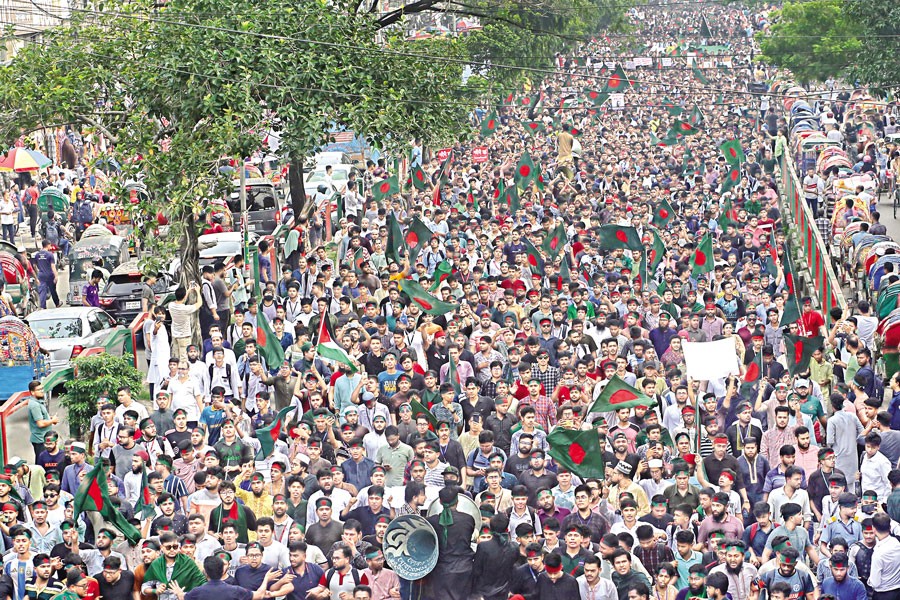
Published :
Updated :

As the anniversary of the July mass uprising continues, it is also time to examine the achievements and disappointment of this historical event critically. The task is challenging and also problematic due to the complex nature of the mass uprising and subsequent developments in the country over the past year. There is no doubt that the most visible and successful achievement of the student-led movement is the downfall of the authoritarian regime of Sheikh Hasina on August 5 last year. It was the day when Bangladesh re-emerged as a country boldly asserting its sovereignty and independence. The sovereign status of the country was systematically undermined during the authoritarian regime.
Nevertheless, the fall of the brutal regime is not the end of the story, as the mass uprising has widened the expectations of the people. The downfall of Hasina is also a point of a new beginning to rebuild the country in a balanced and sustainable way, thereby curbing socio-economic disparity. It opens the door to restoring the freedom of speech and reversing the course of hate and intolerance. The bloody and forceful departure of the tyrant also presents an opportunity to reshape democratic institutions for the greater interests of the nation. All these are big tasks and not possible to complete within a short period. Instead the same will require persistent efforts.
Immediately after Hasian's ouster and escape to seek refuge in India, the nation dipped into a chaotic disorder for the time being. With the killing of at least 1,400 people and injury to several thousand others by the tyrant's forces and goons in 36 days of the mass uprising, some amount of disorder was not unexpected. It is also true that some undesirable things happened at that time, undermining the spirit of the mass uprising.
It is also well known that a large number of people were intimidated over the 15 years of the tyrant by law-enforcing agencies, along with leaders and activists of the ruling party, Bangladesh Awami League (BAL), to be exact, for differences in their political positions. Many of the tortured did not waste the opportunity to take revenge. Therefore, several BAL leaders and activities came under attack. Top leaders of the party, however, escaped, and many fled to India. They are now staying there thanks to the generosity of the Modi-led Indian government in return for serving the Indian interests for more than a decade.
Some expected that things would be normalised automatically or that there would be little chaos. It was a misconceived notion, as the country's political transition did not occur through normal democratic means. More than a month-long movement, that witnessed venting of a decade-long legitimate anger and disappointment, led to the bloody mass uprising and compelled the tyrannical regime to fall.
Then the Yunus-led interim government took charge shouldering two immediate tasks: restoring law and order and fixing economic mismanagement. Despite several efforts, law and order are still a matter of grave concern in the country. Economic management has, however, improved modestly, and more progress is expected. It is, however, disappointing that some critical areas like education, health and transport are still carrying the legacy of the tyrant regime due to lack of effective intervention from the interim government. Instead of taking proper measures do some urgent rectifications, the over-ambitious move of comprehensive reforms will take time. The country is yet to regain normalcy by adjusting with the changeover.
So, the ultimate success of the July uprising will depend on addressing the socio-economic disparity in an effective and sustainable manner and also on the smooth transition to a democratic process. The road is long with a number of barriers and there is no easy or short-cut to move ahead. It is thus necessary to continue the fight.
asjadulk@gmail.com


 For all latest news, follow The Financial Express Google News channel.
For all latest news, follow The Financial Express Google News channel.